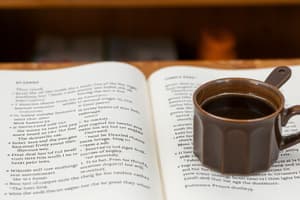Podcast
Questions and Answers
What is the term for a scene in a story that occurred before the present time in the story?
What is the term for a scene in a story that occurred before the present time in the story?
- Flashback (correct)
- Falling Action
- Foreshadowing
- External Conflict
What type of poetry does not rhyme or have a measurable meter?
What type of poetry does not rhyme or have a measurable meter?
- First-Person Point of View
- Hyperbole
- Figurative Language
- Free Verse (correct)
Which literary device uses words in a way other than their literal meanings to make a comparison or add emphasis?
Which literary device uses words in a way other than their literal meanings to make a comparison or add emphasis?
- Foreshadowing
- Hyperbole
- Figurative Language (correct)
- First-Person Point of View
What is the term for extreme exaggeration used for emphasis or effect?
What is the term for extreme exaggeration used for emphasis or effect?
Which point of view is used when the narrator is a character in the story who describes things from his or her own perspective?
Which point of view is used when the narrator is a character in the story who describes things from his or her own perspective?
Flashcards are hidden until you start studying
Study Notes
Literary Devices and Terms
- Allegory: a work that conveys a hidden meaning, usually moral, spiritual, or political, through symbolic characters and events.
Sound Devices
- Alliteration: the occurrence of the same letter or sound at the beginning of adjacent or closely connected words.
Literary References
- Allusion: a brief reference to a real or fictional person, event, place, or work of art.
Character Analysis
- Antagonist: the opponent or enemy of the main character, or protagonist.
- Characterization: the process by which the writer reveals the personality of a character.
- Direct Characterization: the writer or a narrator tells the reader what the character is like.
- Dynamic Character: a character who undergoes a significant internal change over the course of a story.
Story Elements
- Biography: the life history of an individual, written by someone else.
- Climax: when the problem reaches its most intense point and begins to be resolved.
- Conflict: a struggle between opposing forces.
- Dialogue: the conversation between characters in a work of literature.
- Diction: the author’s specific word choice.
- Exposition: the opening event (what happens at the beginning/the main problem that the main character faces).
Studying That Suits You
Use AI to generate personalized quizzes and flashcards to suit your learning preferences.




